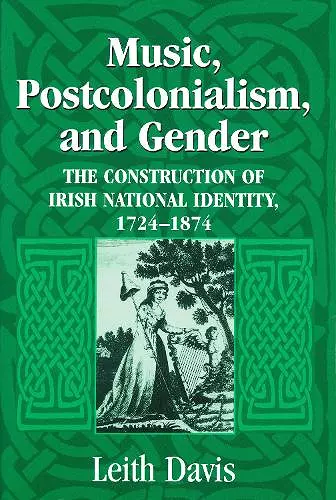Music, Postcolonialism, and Gender
The Construction of Irish National Identity, 1724–1874
Format:Paperback
Publisher:University of Notre Dame Press
Published:23rd Nov '05
Currently unavailable, and unfortunately no date known when it will be back
This paperback is available in another edition too:
- Hardback£108.00(9780268025779)

In Music, Postcolonialism, and Gender, Leith Davis studies the construction of Irish national identity from the early eighteenth until the mid-nineteenth centuries, focusing in particular on how texts concerning Irish music, as well as the social settings within which those texts emerged, contributed to the imagining of Ireland as “the Land of Song.” Through her considerations of Irish music collections by the Neals, Edward Bunting, and George Petrie; antiquarian tracts and translations by Joseph Cooper Walker, Charlotte Brooke, and James Hardiman; and lyrics and literary works by Sidney Owenson, Thomas Moore, Samuel Lover, and Dion Boucicault, Davis suggests that music served as an ideal means through which to address the ambiguous and ever-changing terms of the colonial relationship between Ireland and England.
Davis also explores the gender issues so closely related to the discourses on both music and national identity during the time, and the influence of print culture and consumer capitalism on the representation of Irish music at home and abroad. She argues that the emergence of a mass market for culture reconfigured the gendered ambiguities already inherent in the discourses on Irish music and identity.
Davis’s book will appeal to scholars within Irish studies, postcolonial studies, gender studies, print culture, new British history, eighteenth- and nineteenth-century studies, and ethnomusicology.
"This is an original, well-written book that will be of great interest to scholars in Irish studies, particularly the many working within postcolonial and feminist theoretical frameworks." —Mary Jean Corbett, Miami University
"Leith Davis has written an exemplary, original, and sophisticated book that displays both a wide and deep knowledge of the discourse about Irish music from its earliest beginnings and a complete mastery of postcolonial theory as it relates to Irish studies." —Elizabeth Butler Cullingford, University of Texas at Austin
“Davis writes very much as a literary and cultural critic, not as a musicologist, but hers is a stimulating interdisciplinary study, illustrated with engravings and sheet music that demonstrate how the association of Ireland and orality grew out of print culture.” —Studies in English Literature
“Leith Davis’ book . . . is, ambitiously, ‘concerned with how the discourse of music became increasingly gendered in the eighteenth and nineteenth centuries as gender was utilized variously in the representation of both nationalist and colonialist formations.’ . . . Davis traces these knotted lines of resistance and hegemony through eight cogent and convincing essays, each one studying a particular moment in Irish musical discourse.” —British Association for Romantic Studies Bulletin and Review
ISBN: 9780268025786
Dimensions: 229mm x 152mm x 18mm
Weight: unknown
344 pages